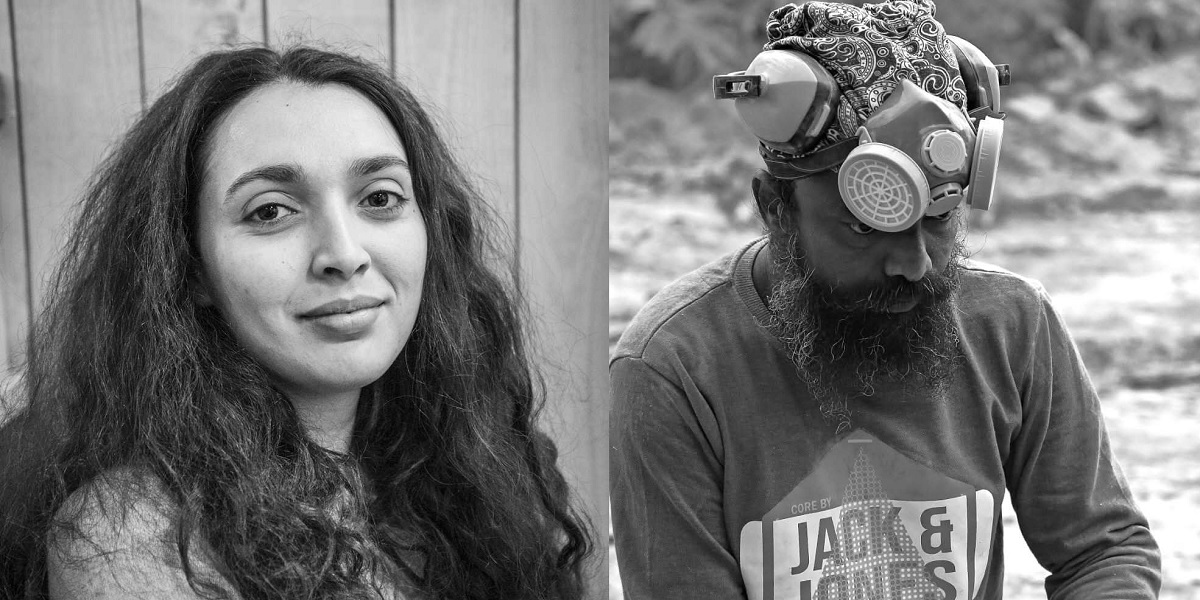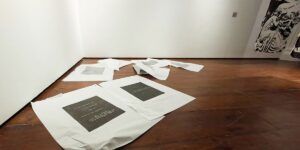Published Oct 23, 2025 | 5:39 PM ⚊ Updated Oct 25, 2025 | 2:56 PM

Hanan Benammar and Hochimin PH
Synopsis: Artworks by Algerian-French artist Hanan Benammar, displayed at the Durbar Hall Gallery in Kochi, Kerala, as part of an ongoing exhibition, were vandalised by artists Hochimin PH and Sudhamshu, who claimed the Malayalam translations contained obscene, anti-women language. The Kerala Lalithakala Akademi condemned the act as vandalism, emphasising that the exhibition included disclaimers and warning that such attacks threaten artistic freedom and Kerala’s reputation in international art circles. The incident has sparked debate among artists and critics over cultural sensitivity, freedom of expression, and the boundaries of public art.
Six works by an international artist displayed at the Durbar Hall Gallery in Kochi, Kerala, as part of the ongoing international exhibition Estranged Geographies, were vandalised by artists Hochimin PH and Sudhamshu on the evening of Wednesday, 22 October.
The duo targeted works by Algerian/French artist Hanan Benammar, claiming they were obscene. Benammar, based in Oslo, Norway, is a noted feminist artist who explores themes of language, gender, and political activism.
The disputed works are part of Benammar’s 2021 series God Eat Your Dad. A text accompanying the work describes it as follows:
“Benammar asked people she knows in different countries the following question: What is the worst, ugliest, most vulgar and insulting thing you can say in your language? She received the answers in the form of powerful expressions from the different countries. The artist then translated the expressions into English and Norwegian, and then sent them on to Nordland, Finnmark, Telemark and Vestlandet, to have the expressions formulated in Norwegian dialects.”

Artworks at the Durbar Hall Art Gallery in Kochi were vandalised during the ongoing international exhibition
Local artists in Kerala, including Hochimin, objected to the artworks, particularly their Malayalam translations, which they claimed amounted to abuse against women.
The Kerala Lalithakala Akademi condemned the incident, calling it a threat to artistic freedom. Chairperson Murali Cheeroth said the exhibition included disclaimers about explicit content and accused the group of bypassing dialogue to attack the gallery.
A formal complaint has been filed by the Akademi at the Kochi City Police Station.
“Usually, it is the Sangh Parivar who reacts emotionally in the name of morality, but it is not fair to vandalise something simply because one lacks the understanding to appreciate the art” – Artist Gigi Scaria.
Artist Hochimin PH told South First that he respects Benammar but not her artwork.
“There were seven printouts with extremely obscene language, against women. The curator should have checked how it would reflect in a society like Kerala. I didn’t vandalise or tear anything,” he said.
He further claimed that he removed the artworks after informing Murali Cheeroth, and alleged that Curator Anushka was paid ₹6 lakh but failed to justify the work’s presentation.
“When a Norwegian text is translated to Malayalam, meanings can change completely. Every unparliamentary word there is a by-product of patriarchy and fascism – how can we accept that?” he asked, also alleging “financial irregularities” in the Akademi’s handling of Norwegian funds.
Art critic Johny ML supported Hochimin’s stand, calling the incident “a matter of perspective.”
“There was no curatorial mediation. A direct Malayalam translation made the work insensitive. The Akademi should have ensured warnings and respected local sentiments,” he said.
“Art is not unfamiliar with obscenity or nudity, but each public space has its own boundaries. The Akademi, being government-funded, must ensure art doesn’t hurt social sensibilities. Ironically, there’s an invisible jury deciding who gets space at the gallery,” he added.
“This will not affect Kerala’s reputation – the work was not destroyed, only removed. In fact, destruction sometimes increases an artwork’s value.”
Cheeroth condemned the vandalism, stressing that the Akademi is not an institution to censor art.
“If Hochimin finds the work offensive, that’s his personal issue, not everyone’s,” he told South First.
“Hanan Benammar is an artist who has faced male chauvinism and fascism. Her work reflects political understanding and lived experience as a migrant, born in Algeria and now based in Norway. She translates suffering into artistic expression. Linguistic expression is crucial today – what’s wrong in using language as a medium of protest and art?”
Cheeroth added that vandalism is not a form of protest but an act of fascism in itself.
“If the Norwegian Embassy proceeds with legal action, Hochimin may have to pay for the damaged artwork. This act was meant to tarnish my image and the Akademi’s reputation,” he alleged.
Estranged Geographies, curated by Anushka Rajendran and Damien Christinger, features artists from France, Norway, Switzerland, and Kerala, highlighting regional art within a global context.
The organisers called the vandalism a serious blow to freedom of expression and to Kerala’s reputation in the art world.
Art critic P Sudhakaran similarly termed the attack a sign of insecurity.
“When you target a work of art in the name of obscenity, you are revealing your own obscenity. This attack has, in fact, proved the politics of the artwork right. The artist, Hanan Benammar, sought to highlight precisely this abusive, patriarchal attitude of men,” he told South First.
“You may agree or disagree with the work, critique it as bad art or even non-art; that is your right. But vandalism is not protest. To tear a work from a public wall and live-stream the act on social media is not dissent; it is an act of criminality. It strikes at the very idea of artistic freedom and the sanctity of public art spaces.”
Artist Gigi Scaria said the act was driven by a “parochial mentality” and “perhaps a desire for a feeling of fame.”
“It is shocking that one artist would destroy the work of another. Fascism operates in mysterious ways. Removing a work of art from a space without the consent of the artist or authorities is itself an act of vandalism. Hochimin removed the artwork inside the Akademi, and this is a strange incident. Usually, it is the Sangh Parivar who reacts emotionally in the name of morality, but it is not fair to vandalise something simply because one lacks the understanding to appreciate the art,” he told South First.
“The important point is that Hochimin is generally considered lenient towards the Left. His actions now complicate our cultural space. We often say Kerala is progressive, yet beneath the surface, similar to the Sangh, we end up destroying what we do not understand. This is a parochial mentality. Alleging financial irregularities in the midst of controversy is merely a defensive tactic to divert attention from the real issue. At its core, this is about a cheap, chauvinistic ego, and perhaps a desire for a fleeting five minutes of fame.”
Scaria warned that such incidents could damage Kerala’s standing in international art circles.
“In any case, in international artistic forums, Kerala’s progressive stance may soon be questioned. We risk failing to maintain our claims as a progressive and safe space for art.”
Artist Jalaja PS condemned the act and questioned the vandals’ authority to define what constitutes art.
“Who has the authority to define what art is?” she asked, calling the act an attack against women and a “pure act of male chauvinism and fascism.”
“Obscene language can be a form of protest or even a defensive mechanism. The exhibition had a curator’s note – anyone could read it and decide whether to view the work or not. Disagreement can be expressed democratically; vandalism cannot,” she added.
Jalaja warned that such incidents could send a negative message to international art circles, especially with the Kochi-Muziris Biennale approaching.
“If Kerala is seen as unsafe for art, that’s pathetic. When an artist can’t respect another’s form of expression, how can he call himself an artist?” she asked.
Artist Kavitha Balakrishnan from Thrissur called the incident “shocking and distressing.” She said that whether something is art or not is a philosophical question, but destroying it can never be justified.
“Hanan’s work was not just art – it was a political act questioning moral hypocrisy and cultural control,” she added.
(Edited by Dese Gowda)

